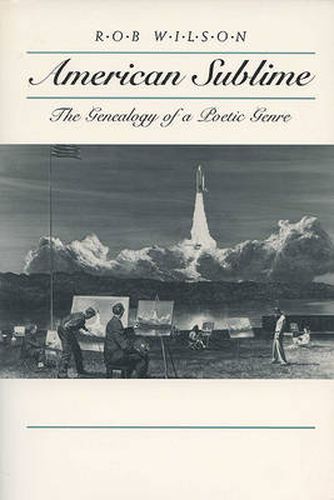Readings Newsletter
Become a Readings Member to make your shopping experience even easier.
Sign in or sign up for free!
You’re not far away from qualifying for FREE standard shipping within Australia
You’ve qualified for FREE standard shipping within Australia
The cart is loading…






Tracing ideas of the sublime in American literature from Puritan writings to the postmodern epoch, Rob Wilson demonstrates that the North American landscape has been the ground for political as well as aesthetic transport. He takes a distinctly historical approach and explores the ways in which experiences of the American landscape instill desire for other kinds of vastness: self-expansion, national expansion, and American political power. As Wallace Stevens put it, the American will takes dominion everywhere.
Wilson sets the stage for his genealogy with a discussion of the classical notion of the sublime (taken primarily from Longinus) and the ways that notion was pragmatically transformed by its American setting and appropriated by American poets. He follows this transformation in successive chapters on the Puritans (Bradstreet) through the Naturalists (Livingston and Bryant), from the epitome of the American sublime (Whitman) to the greatest of the modernists (Stevens) and its present-day incarnations (Ashbery and others). Writing today under the sign of Hiroshima, contemporary writers must struggle with the concept of the sublime within a context of spiralling technologies and nuclear force that calls into question the long-standing American sacralization of power.
Throughout American Sublime, Wilson engages in an original theoretical inquiry into the sublime as term, topic, complex, and controversial idea in literary and critical history. Furthermore, he undertakes his historical study from an avowedly postmodern perspective, one that draws on and extends the work of Jameson, Lyotard, Foucault, Lentricchia, Harold Bloom, and others.
$9.00 standard shipping within Australia
FREE standard shipping within Australia for orders over $100.00
Express & International shipping calculated at checkout
Tracing ideas of the sublime in American literature from Puritan writings to the postmodern epoch, Rob Wilson demonstrates that the North American landscape has been the ground for political as well as aesthetic transport. He takes a distinctly historical approach and explores the ways in which experiences of the American landscape instill desire for other kinds of vastness: self-expansion, national expansion, and American political power. As Wallace Stevens put it, the American will takes dominion everywhere.
Wilson sets the stage for his genealogy with a discussion of the classical notion of the sublime (taken primarily from Longinus) and the ways that notion was pragmatically transformed by its American setting and appropriated by American poets. He follows this transformation in successive chapters on the Puritans (Bradstreet) through the Naturalists (Livingston and Bryant), from the epitome of the American sublime (Whitman) to the greatest of the modernists (Stevens) and its present-day incarnations (Ashbery and others). Writing today under the sign of Hiroshima, contemporary writers must struggle with the concept of the sublime within a context of spiralling technologies and nuclear force that calls into question the long-standing American sacralization of power.
Throughout American Sublime, Wilson engages in an original theoretical inquiry into the sublime as term, topic, complex, and controversial idea in literary and critical history. Furthermore, he undertakes his historical study from an avowedly postmodern perspective, one that draws on and extends the work of Jameson, Lyotard, Foucault, Lentricchia, Harold Bloom, and others.